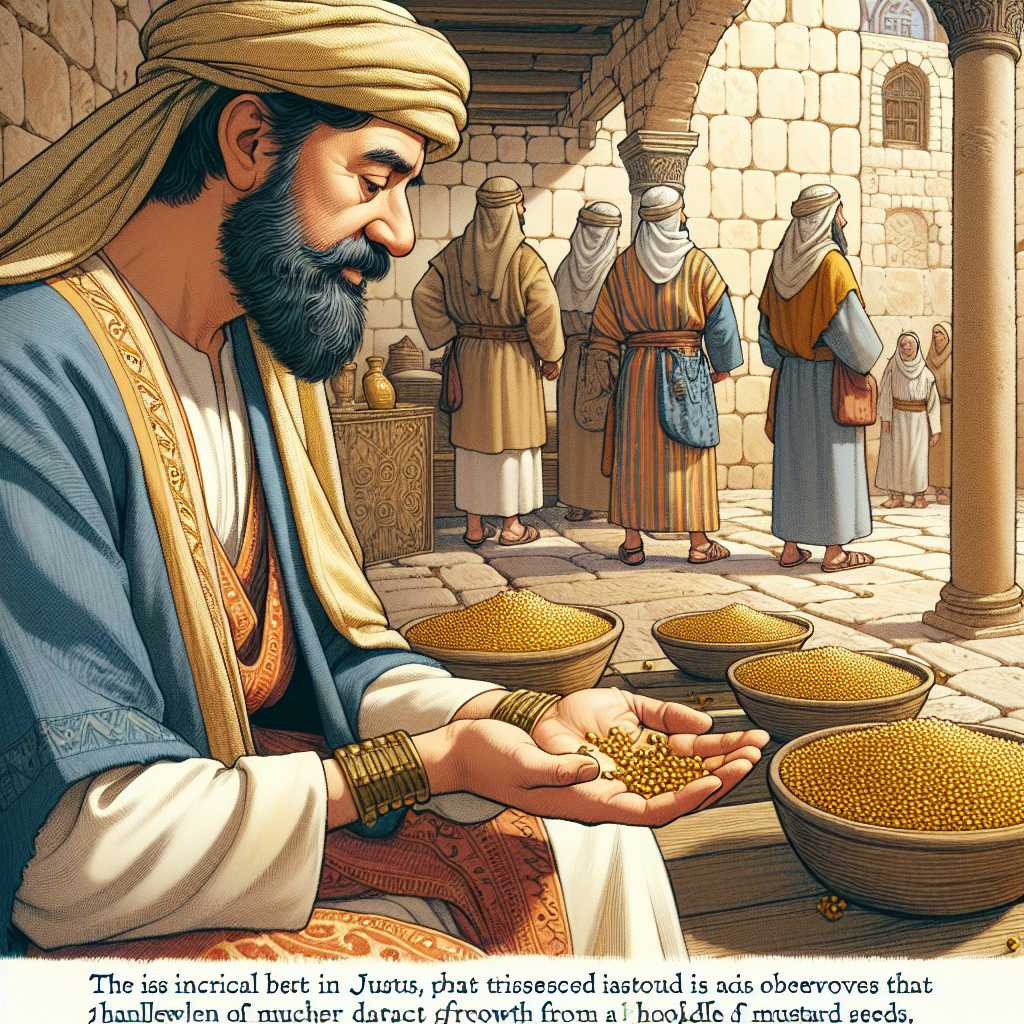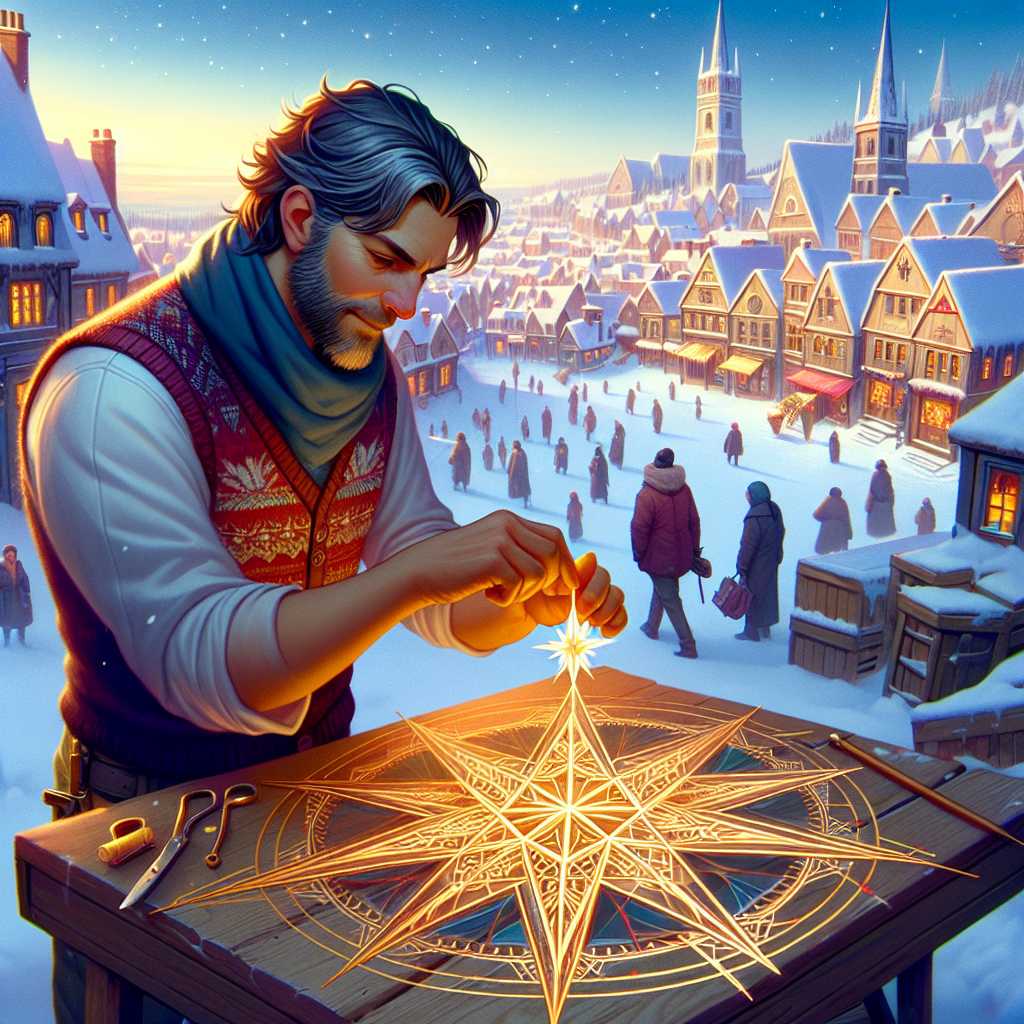
In the days of yore, nestled among the rolling hills and olive groves of the Galilean countryside, there was a humble village called Bethsaida where lived a merchant by the name of Justus. Justus was a simple man, dedicated to trading in spices and seeds, traveling the length and breadth of the land to gather the finest of nature's bounty. His most treasured possession, however, was a small sack of mustard seeds he believed held the key to an age-old legend.
One breezy autumn morning, Justus prepared for his journey to Jerusalem, with the goal of selling his wares at the marketplace. Clutching his sack of mustard seeds, he whispered a silent prayer for prosperity and set forth on his journey. As he walked the dusty road, the wind carried stories from pilgrims returning from the sacred city. Their tales were filled with hope, speaking of miracles and a teacher who spoke with divine wisdom. Intrigued, Justus decided that on his descent into the city, he would seek out this wandering rabbi and listen to his teachings.
Days passed, and as Justus approached the bustling gates of Jerusalem, the air was thick with the buzz of traders and the scent of exotic foods. He unfurled his simple stall among the opulence of merchants' tents and laid out his wares with care. The mustard seeds, small and unassuming, glistened in the sunlight, catching the eyes of the wise and curious alike.
"Those seeds may be small, but within them lies a great mystery," murmured an elderly woman as she walked past, her eyes twinkling with stories untold.
Troubled by rest, Justus recounted the tales of the great teacher and set out to find him in the quiet of the afternoon. The path led him to a gathering outside the city walls where many had gathered to hear this miraculous healer and sage. There, among the throng, stood Jesus of Nazareth, speaking with a voice that seemed to resonate with the very soul of the earth.
Listening intently, Justus heard teachings like he'd never heard before, words that pierced his heart and kindled something he couldn't quite name. As the sun began to sink behind the hills, Jesus spoke of faith, using the very object Justus cherished above all.
"The kingdom of heaven," Jesus said, "is like a mustard seed, which a man took and planted in his field. Though it is the smallest of all seeds, yet when it grows, it is the largest of garden plants and becomes a tree, so that the birds come and perch in its branches."
In that moment, an epiphany struck Justus like a lightning bolt of understanding. His heart swelled with the knowledge that the seeds he carried were not just for trade, but for lessons on growth and faith. Jesus’ words cast a gentle light on the purpose hidden beneath layers of earth and time—a realm where the smallest acts of faith could transform the world.
The days that followed were unlike any Justus had ever known. When he returned to his stall, he began sharing the tale of the mustard seed with everyone who would listen. He spoke about faith small yet mighty enough to move mountains, and his humble seeds became a symbol, bringing hope to the souls hungry for deeper meaning. Some marveled, some pondered, and others simply smiled, but with each interaction, the seeds of faith were sown.
One evening, a Pharisee stopped at Justus' stall, intrigued by the stories spreading like wildfire through the city. His eyes were keen and searching, drawn to the simplicity of the merchant's tale.
"What do you hope to achieve, peddling such insignificant seeds with tales of grandeur?" he asked, skepticism draped upon his voice.
Justus, with gentle wisdom, replied, "The seeds themselves seem insignificant to your eyes, perhaps. But it is not just a seed that we sell, but rather the vessel of a promise, of potential waiting patiently to burst forth into full life. Isn’t it often the smallest gestures of kindness that grow into towering oaks of strength?"
His words planted a spark of curiosity and humility within the Pharisee, leaving him to ponder the vast chasm between seen and unseen, known and unknown.
As months turned into years, Justus' stall became a haven of hope and encouragement, a place where those weary from the trials of life could seek solace and reassurance. He traveled further, spreading the story across villages and cities. Justus became known not as just a merchant of seeds, but a disciple of faith, planting more than just mustard: he planted love.
From that day to this, the legend of the humble seed has never faded. It whispers its enduring message through orchards and fields, across scriptures and hearts, reminding each soul of the incredible power nestled within faith—faith, which with the softness of a rain drop and the warmth of sunlight, can grow into the greatest of trees, sheltering many under its outstretched arms.
For in the parable of the mustard seed and the journey of Justus, we learn not only of the growth of plants but of the profound truth—that within each of us lies the potential to nurture life and faith that touches the heavens, embodying the very essence of divine love.










